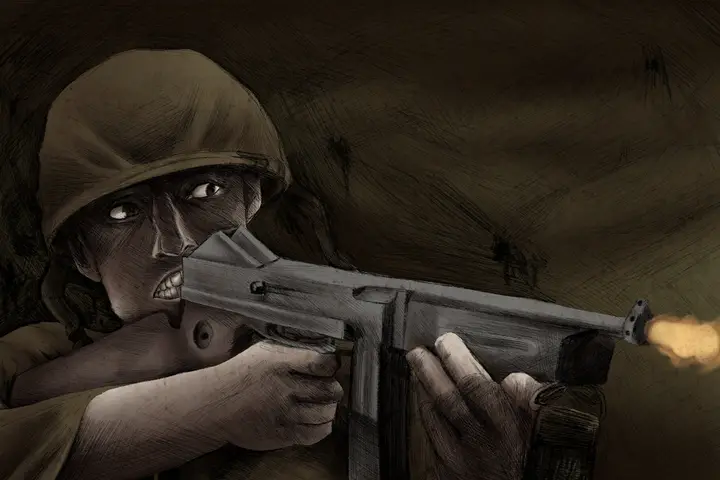Video game development is a multi-billion dollar market that continues to grow at an exponential rate. The total number of active gamers worldwide is approximately three billion; that’s a 32% increase from 2016 when that number was just over two billion.
These statistics show the mass appeal video games have on the global population. As a medium of entertainment, they’re as relevant as literature and cinema. Many gamers even argue that video games are a form of art that wield the potential to influence and educate the masses. Unlike readers and cinephiles, gamers exercise control over the narratives they consume.
Unfortunately, this sense of “control” has created a misconceived stigma in mainstream media. Shooter video games seem to glorify war and violence in a way that no other mode of entertainment can match; they offer consumers an opportunity to personally participate in the action. This has led some to perpetuate a hackneyed, ill-founded argument: Many video games are violent, so they must promote violence.
While an understandable conjecture, the presence of violence in a creative work does not necessarily equal an endorsement. For example, take films like “Apocalypse Now” and novels like “Catch-22.” Although they both feature deadly combat situations, their overall message is still one of anti-war. So why should shooter video games be any different?
When “Call of Duty” Went Anti-War
Many know “Call of Duty” as a bombastic, high-octane shooter video game franchise that rakes billions of dollars from every new installment. Over the last two decades, the franchise has become a household name. For better or for worse, its legacy is synonymous with gaming itself.
Yet, some may be unaware of “Call of Duty’s” humble beginnings. Activision released the original “Call of Duty” in 2003. At the time, it was a straightforward, military first-person shooter set during World War II.
WW2 shooters were all the rage in the late ‘90s and early 2000s, with franchises like “Medal of Honor” and “Brothers in Arms” amassing large fanbases. These franchises emphasized the heroism, patriotism and sacrifice displayed by Allied combatants in WW2 and allowed gamers to play as one of “the good guys.”
However, that angle felt overdone and oversaturated by 2008, which encouraged Activision to release a different kind of WW2 shooter that same year. “Call of Duty: World at War” explored darker themes of WW2, forcing players to assume the role of a desperate soldier rather than an upstanding hero.
Players engage in battles across the Eastern Front (Germans vs. Soviets) and Pacific Theater (Americans vs. Imperial Japanese) of WW2; both military campaigns are infamous for their bloodshed and cruelty. As an American, players may be tasked to use inhumane flamethrowers to clear out Japanese mortar pits. As a Soviet, players are powerless to stop their comrades from executing the surrendering German soldiers, a horrific yet common war crime during WW2.
“Call of Duty: World at War” never blatantly says “war is bad.” Instead, it simply refuses to gloss over the extreme levels of violence and depravity that occurred in humankind’s greatest conflict. As opposed to watching or reading about it, gamers participate in the slaughter and experience an unromanticized depiction of combat firsthand.
The game ends with the Soviets capturing the German Reichstag. Players are unable to revel in victory for long before the screen goes black and displays a heart-wrenching fact: “60 Million Lives Were Lost as a Result of World War II.” It leaves a bitter taste in a player’s mouth, especially since they just contributed to that kill count and had fun doing it.
How’s that for an anti-war message?
A Forgotten Spec Ops Story
“Spec Ops” is another franchise that attempted a major thematic shift after years of specializing in patriotic shooter video games. When creating 2012’s “Spec Ops: The Line,” the team at Yager Development sought to examine warfare through a critical and mature lens.
“We invite the player to encounter some of the more horrific experiences we hear from soldiers,” says Cory Davis, the game’s lead designer, “these are not happy or heroic scenarios, but we feel they are important because they cause us to question ourselves.”
The game’s narrative follows an American reconnaissance team searching for the “Damned 33rd,” an infantry battalion that became unresponsive while aiding relief efforts in a crisis-stricken Dubai. Unfortunately, the recon team learns that the 33rd has gone rogue and perpetrated multiple atrocities against Dubai’s civilians.
By casting U.S. forces as the enemy faction, “Spec Ops: The Line” creates a thought-provoking distinction; simply put, it established that “bad people do bad things,” and their country of origin is irrelevant.
The game also questions the player’s morality as it places them in increasingly murky moral dilemmas. Civilians often die as a result of the player’s decisions, making it harder to feel a sense of superiority over the enemy faction. There’s a continuous descent into depravity and bleakness that occurs as the game unfolds; in fact, “Heart of Darkness” by Joseph Conrad was a chief source of inspiration for the game’s developers. Instead of a hero, players begin to feel more like a regret-filled survivor.
War is terrible, and there are often no right answers. Very few will be patting themselves on the back by the time the credits roll.
Experiencing Anti-War through Gameplay
Both of these shooter video games exemplify the unique contributions of gaming toward the anti-war movement. It’s one thing to witness the horrors of combat on the big screen — take “All Quiet on the Western Front” (2022), for instance — it’s an entirely different experience to participate in those same horrors. By playing games like “Call of Duty: World at War” and “Spec Ops: The Line,” players take part in combat at its least glamorous; they immerse themselves in the pointless barbarity of battle and gain a better sense of war’s negative effects.
Moreover, such gameplay experiences place their own morality into question. How far would they go to survive? Are there any true winners in war?
This isn’t to say that all shooter video games are anti-war. On the contrary, many of them lack any meaningful nuance or commentary. However, this should not take away from the promising potential of the medium. When done right, video games can create harrowing narratives that shock us to our core. They allow us to experience dangerous situations from the safety of our living room. Although we initially seek to be entertained, we may instead find education, clarification or even enlightenment — and that’s the best thing a piece of art can achieve.

















